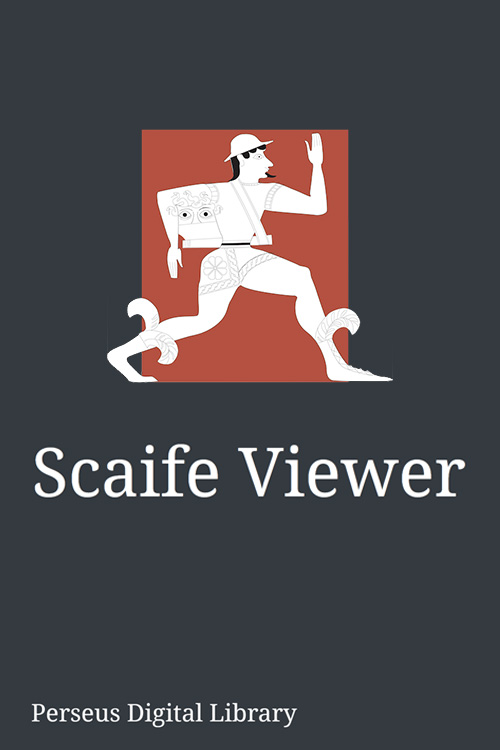About Gregory Ralph Crane
Gregory Ralph Crane is a computer science professor and scholar of classical studies.
Biographical details
Basic information
Biographical mentions
At the same time, he has a long-standing interest in the relationship between the humanities and rapidly developing digital technology. He began this side of his work as a graduate student at Harvard when the Classics Department purchased its first TLG authors on magnetic tape in the summer of 1982. He developed a Unix-based full text retrieval system for the TLG that was widely used in North America and Europe in the middle 1980s. He also helped establish a typesetting consortium to facilitate scholarly publishing. Since 1985 he has been engaged in planning and development of the Perseus Project, which he directs as the Editor-in-Chief. Besides supervising the Perseus Project as a whole, he has been primarily responsible for the development of the morphological analysis system which provides many of the links within the Perseus database.
From 1998 through 2006 he directed a grant from the Digital Library Initiative to study general problems of digital libraries in the humanities. Under the DLI-2 program, he worked on a range of topics, including such topics as London, the history of Mechanics, and the American Civil War. Each of these collections provided new insights into the implications of such new electronic tools on learning. In 2006, he produced a named entity identification system, published a 55 million word collection, and authored several publications describing the system.
With the rise of the Google Books project in 2004, he began to focus upon the problems and opportunities that arise when whole libraries rather than curated collections become available on-line. The broad range of projects that he suppported with support from the DLI-2 program, the Institute for Museum and Library Services, and the Mellon Foundation provided a broad foundation within which to frame his current generation of research projects on Classical Studies at Perseus. Crane overees the overall research program at Perseus.
Crane is especially interested in helping the emerging Cyberinfrastructure serve the needs of the humanities in general and classical studies in particular.
Source: perseus.tufts.edu on 07/19/2020
Top works
Authored works by Gregory Ralph Crane
Associated works
Role: Editor


Role: Translator
Role: Contributor
Mentions of Gregory Ralph Crane
as.tufts.edu
Gregory Crane's interests are twofold. On the one hand, he has published on a wide range of ancient Greek authors (including articles on Greek drama and Hellenistic poetry and a book on the Odyssey). Much of his traditional scholarly work has been devoted to Thucydides; his book The Blinded Eye: Thucydides and the New Written Word appeared from Rowman and Littlefield in 1996; his second Thucydides book (The Ancient Simplicity: Thucydides and the Limits of Political Realism) was published by the University of California Press in 1998.Gregory Crane's interests are twofold. On the one hand, he has published on a wide range of ancient Greek authors (including articles on Greek drama and Hellenistic poetry and a book on the Odyssey). Much of his traditional scholarly work has been devoted to Thucydides; his book The Blinded Eye: Thucydides and the New Written Word appeared from Rowman and Littlefield in 1996; his second Thucydides book (The Ancient Simplicity: Thucydides and the Limits of Political Realism) was published by the University of California Press in 1998.
Source: as.tufts.edu on 07/19/2020
engineering.tufts.edu
Gregory Crane is a professor in the Classical Studies Department at Tufts University, and an adjunct professor in the Department of Computer Science. He has a long-standing interest in the relationship between the humanities and rapidly developing digital technology.
Source: engineering.tufts.edu on 07/19/2020
humboldt-professur.de
(en) Classical philology: Gregory Ralph Crane combines ancient philology and computer science in an innovative approach. He uses computer science methods to systematize the cultural development of humans. He owes his reputation as a pioneer of digital humanities to the development of the Perseus Digital Library, an extensive and freely accessible online library for ancient sources. With his call to the University of Leipzig, the Institute for Computer Science is to be expanded into an internationally visible center of digital humanities. no longer in funding. Nominating university: Universität Leipzig.
Prof. Dr. Gregory Ralph Crane: born 1957, PhD in classical antiquity at Harvard University in 1985, then assistant professor there. Involved in planning the Perseus project since 1985, assistant professor since 1992, then associate professor at TUFTS University, Medford, USA. Since 1998 owner of the Winnick Family Chair of Technology and Entrepreneurship. For his achievements, he was awarded the Google Digital Humanities Award 2010. In April 2013 he took up his Humboldt Professorship and took over the Chair for Digital Humanities at the Institute for Computer Science at the University of Leipzig.
(de) Klassische Philologie: Gregory Ralph Crane kombiniert in einem innovativen Ansatz Altphilologie und Informatik. So wendet er Methoden der Informatik zur Systematisierung der kulturellen Entwicklung des Menschen an. Seine Reputation als Pionier der Digital Humanities, der digitalen Geisteswissenschaften, verdankt er der Entwicklung der Perseus Digital Library, einer umfangreichen und frei zugänglichen Online-Bibliothek für antike Quellen. Mit seinem Ruf an die Universität Leipzig soll das Institut für Informatik zu einem international sichtbaren Zentrum der Digital Humanities ausgebaut werden. nicht mehr in Förderung. Nominierende Universität: Universität Leipzig
Prof. Dr. Gregory Ralph Crane: geb. 1957, Promotion im Bereich klassische Altertumswissenschaften an der Harvard University 1985, danach dort Assistant Professor. Seit 1985 als Co-Director an den Planungen zum Perseus-Projekt beteiligt, seit 1992 als Assistant Professor, dann als Associate Professor an der TUFTS University, Medford, USA. Seit 1998 Inhaber des Winnick Family Chair of Technology and Entrepreneurship. Für seine Leistungen wurde er unter anderem mit dem Google Digital Humanities Award 2010 ausgezeichnet. Im April 2013 hat er seine Humboldt-Professur angetreten und den Lehrstuhl für Digital Humanities am Institut für Informatik an der Universität Leipzig übernommen.
Source: humboldt-professur.de on 07/19/2020
wordpress.com
Gregory Crane (Tufts University) introduced day 2 with a presentation on the significance of OCR in the Humanities. In particular, Crane listed 3 basic changes:
1. The transformation of the scale of questions in terms of breadth and depth;
2. The rise of student researchers and citizen scholars: these figures play a critical role as professionals alone can no longer tackle the large amount of data out there;
3. The globalisation of cultural heritage: dealing with global activity and cultural heritage has to be, as the word suggests, a global effort as Europe and North America’s expertise is no longer enough.
Crane then moved on to describing dynamic variorum editions as one of OCR’s greatest challenges. How do we create self-organising collections? Crane stressed that even with the all possible crowd-sourcing, we still need to process data as automatically as possible. The ‘New’ Variorum Shakespeare series (140 years old) is a good example of this. After all, the winning system is the most useful, not the smartest!
A Classicist by origin, Crane then shifted his focus to the Graeco-Roman world and illustrated the problems ancient languages such as Latin and Ancient Greek pose to OCR technology. What do we do with 2000+ years of Latin? What do you do with dirty OCR? However bad, Crane explained, OCR helped Tufts detect how many of the 25,000 Latin books selected were actually in Latin. Unsurprisingly, OCR analysis revealed that many of these were actually Greek. Crane’s following statement was self explanatory: “OCR often tells us more than metadata can”. Ancient languages such as Classical Greek, Crane continued, can cause numerous problems to OCR technology, as we often encounter polysemy, ambiguity, and changes in terms. So how do we deal with a cultural heritage language? The key, Crane claimed, is to have multiple open-source OCR engines in order to produce better results.
Finally, Crane explained that we are not just producing OCR data, we are changing connections around the world, enabling a transformation of the humanities and the way in which the world as a whole relates to its cultural heritage.
Source: wordpress.com on 07/19/2020









